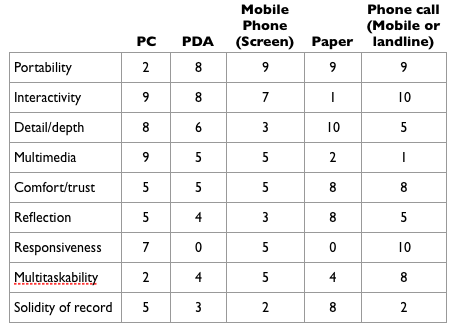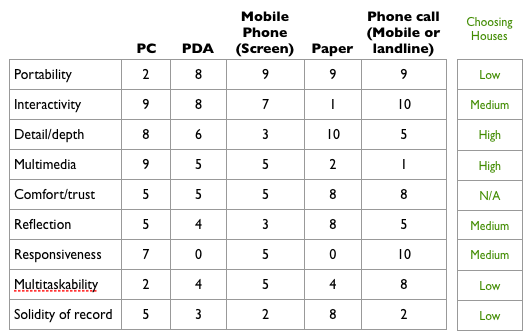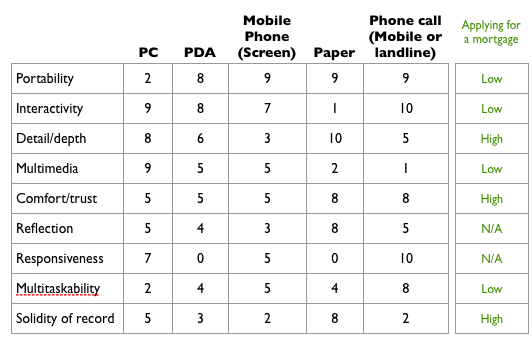April 02, 2005
Not All Problem Solving Involves Design
So, I was reading through my bloglines when I came across Victor's recent post, pointing to an article about how JetBlue CEO David Neeleman's business philosophy is influenced by his work as a (Mormon) missionary, driving a desire for equity in how people are treated. Which is all well and fine, except Victor claims David's approach "shows perfectly how the empathy of great design thinking improves both human experience and the bottom line simultaneously."
"Design Thinking" is a phrase that is getting increasingly bandied about, largely in an attempt to take the methods, practices, and approach of designers and apply it to other realms. A movement I'm definitely sympathetic with.
But a problem arises when we think that any "thinking" that we appreciate is "design thinking." It's very much in Victor's personal and professional interest to associate the term with successes like JetBlue. But it's also disingenuous in this case, because nothing in that piece has anything to do with design or design thinking.
Unless we think that designers have somehow cornered the market on empathy, and anyone being empathetic is utilizing design thinking. Which I think is a pejoration of the concept of empathy, and rapidly moves the phrase "design thinking" into the realm of catchy, but meaningless, buzzwords.
In fact, for all the hugger mugger around the term, I've found only one reasonable attempt to capture its meaning, Dan Saffer's post, "Thinking About Design Thinking." I think it's a great place to start, and, if we're able to maintain Dan's focus on the concept, "design thinking" has potential for truly catching on.
March 27, 2005
Genres Hamper Mobile Internet
A Reuters article made the rounds 10 days ago -- "Web pioneer: Design hampers mobile internet." In it, Tim Berners-Lee decries, "Everyone was supposed to be browsing the Web with their mobile phone, but the problem is that it has not happened."
I've long been frustrated by how people seem to think that content is this formless mass that you can pour into different devices, like water into different glasses. And my thinking around document genres lead me to begin articulating a framework for thinking about content in different devices, as a way to better understand why we're not "browsing the Web with [our] mobile phone[s]."
Document genres are about how form and content come together to address a purpose. In doing so, the rely on our expectations for how that genres is designed in order to facilitate its use. When I open the envelope with my credit card bill, I don't expect a comma-delimited list of purchases in alphabetical order. I expect a tabular list of purchases, in date order. I expect that the first page will summarize my purchases for the period, and provide a space for me to write in how much I plan to pay.
As credit card bills move to the Web, it's important to recognize that, while serving a similar purpose, and having similar content, the fact that it is on the Web means it's a materially different (though related) genre. I bring different expectations to how I utilize a credit card bill on the web, such as: you don't flip through pages finding certain information, you utilize links which allow access to information chunks; the ability to call up payment history from before the period in question; etc.
In the same way that paper-based document genres evolve when they're brought to the web, digital document genres rely on the various devices within which they're viewed. And you can't just take any web page, and expect it to work within any device (remember WAP?).
So, I've started thinking about understanding what genres work best in what devices, and why. It begins by thinking about content-related attributes of different devices.

Some terminology clarification:
Portability - the ability to carry it around
Interactivity - the ability for the device to provide instant feedback to a user's action
Detail/depth - the amount of resolution and detail the device provides
Multimedia - the ability to utilize more than one medium at a time
Comfort/trust - generally, how comfortable and trustworthy people find a device
Reflection - the degree to which a device engenders a user to reflect on the content within. A distinction borrowed from Ellen Lupton in her essay, "The Birth of the User."
Responsiveness - the ability, for when something goes wrong, to get an immediate response that can address the situation.
Multitaskability - the ability to do other things while engaging with the device
Solidity of record -- the degree to which you can rely on the device to maintain a record of action
I graded each device on a scale of 1-10, 10 being best/highest.
When thinking about genres, the concept of "purpose" gets foregrounded. And when thinking of purpose, of the task at hand that someone is trying to accomplish, we realize that purposes/tasks require an appropriate degree of these attributes.
Let's take the long and involved process of buying a house. Looking at some steps along the way, we can get a sense of what tasks require what attributes... And what that says about where document genres are best suited.
So, when you're choosing houses to check out, that task has certain attribute requirements.

You don't want to waste your time visiting a house that's not suited to you, so what's most important is to get a lot of information, and information that *shows* you the house -- photos, videos, QuickTime VR. As you rank the importance of each attribute for the task, and then look across the table, you realize that PCs are exceedingly well-suited to helping people choose houses. It shows why we've gone so quickly from super-brief classified ads to media-rich web pages in a very short time.
How about much later in the process, when you're applying for a mortgage?

The chart suggests why applying for mortgages is still largely rooted in the world of paper -- the crucial elements of comfort/trust and solidity of record. But those are cultural attributes... and you can see that PCs are not all that far behind, and those numbers will doubtless rise over time.
That's enough of this for now. In time I'd love to figure out a way to make this more rigorous, and come up with some methods for taking advantage of this.
